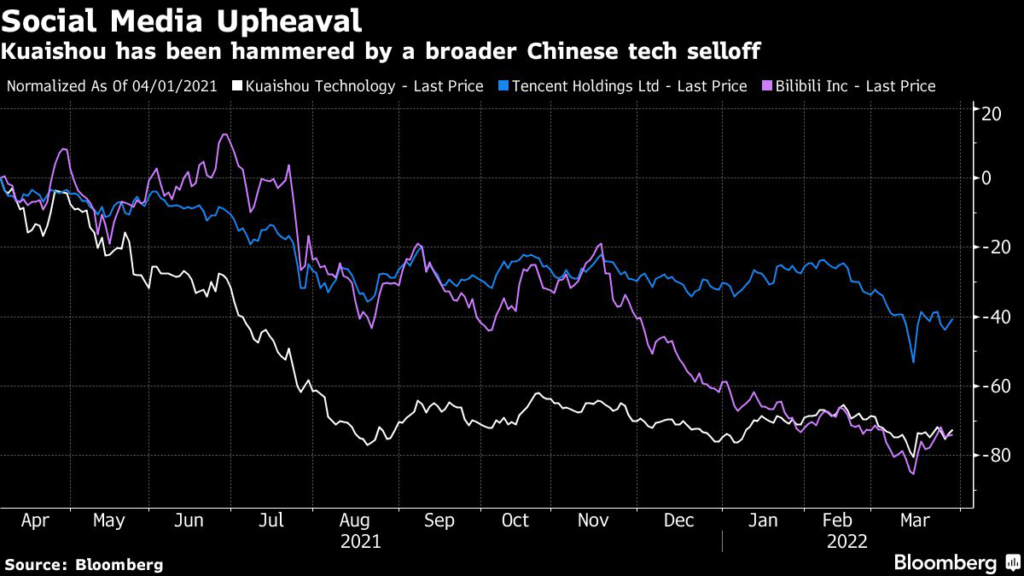(Bloomberg) — Kuaishou Technology shares slid after a Wall Street Journal report stoked investors’ concerns about more curbs on China’s online video industry, dampening optimism over its better-than-expected results.
Its shares rose 8.3% in Hong Kong before reversing course to trade more than 2% lower after the Wall Street Journal reported regulators are considering restrictions on the livestreaming business including daily caps on tipping — a key source of revenue for Kuaishou and its peers. Vice Premier Liu He will make a final decision on the proposed measures, which encompass more content censorship, the Journal reported, citing unidentified sources.
China’s second-largest short video company and its rivals are coping with Beijing’s broad scrutiny over the internet sector, which have included warnings against reckless expansion as well as censorship of a broad range of content deemed undesirable to the state. Regulators may impose a daily limit on gifts live-streaming hosts can accept of 10,000 yuan or $1,570, the Journal reported.
Kuaishou now joins its peers in embracing a new era of cautious expansion in the country’s giant internet sector. The online video platform followed streaming hubs iQiyi Inc. and Bilibili Inc. –- some of the industry’s biggest spenders of past years –- in outlining clearer goals toward break-even. Kuaishou should turn profitable sometime in 2022 on an adjusted net income basis, which excludes certain items, Chief Executive Officer Cheng Yixiao told analysts on a conference call.
Sales rose 35% to 24.4 billion yuan ($3.8 billion) for the three months ended December, versus the 23.1 billion yuan projected by analysts. Its net loss narrowed to 6.2 billion yuan, compared with the 6.3 billion yuan estimated loss, helped by government grants and tax subsidies, typically awarded to up-and-coming Chinese software firms. The company also took a big hit from fair value changes in preferred shares in the year-earlier quarter.
“Live-streaming monetization is pervasive across many China Internet companies including e-sports, e-commerce, video and music streaming, so if spending limits are implemented the impact can be much broader than just the short-video companies,” said Vey-sern Ling, senior analyst at Union Bancaire Privee. “Sentiment on the sector will be dampened after market expectations of regulations peaking.”
Kuaishou Leads Peers Higher After Solid 4Q Beat: Street Wrap
Kuaishou has tried to signal its profitability potential by ramping up monetization while keeping a lid on cost growth – especially in global marketing expenses. Still, it boosted spending on research and marketing by more than 50% in the fourth quarter, reflecting efforts to get into new businesses. Both now account for a larger slice of revenue than a year earlier.
Apart from pursuing new content in areas like sports and music, Kuaishou is also expanding its reach across China’s digital economy. In December, it teamed up with food-delivery giant Meituan to let Kuaishou users access local services through download-free lite apps inside the short-video platform, a model employed successfully by Tencent Holdings Ltd. and TikTok-owner ByteDance Ltd.
Those efforts appear to be paying off — monthly active users grew a better-than-expected 21.5% to 578 million in the December quarter, while average daily time spent per person climbed 32% to 118.9 minutes.
One more area of uncertainty is Kuaishou’s expansion abroad. The Beijing-based company this month lost its international business leader Tony Qiu due to personal reasons, and Cheng now oversees its Kwai and Snack Video apps directly. The two apps have yet to face off against TikTok in major markets like the U.S. Live-streaming and e-commerce could also suffer from shrinking consumer appetite if China’s Covid-19 lockdowns expand.
Cheng himself took over the CEO role from fellow co-founder Su Hua back in October. Kuaishou has lost roughly $180 billion of market value since peaking just days after its 2021 Hong Kong listing, but its shares have outperformed many Chinese internet stocks this year.
“We expect market share gains to continue in online marketing and e-commerce GMV with solid user growth trends and rising engagement,” Jefferies analysts led by Thomas Chong wrote. “We expect solid cost control” in sales and marketing.
More stories like this are available on bloomberg.com
©2022 Bloomberg L.P.











